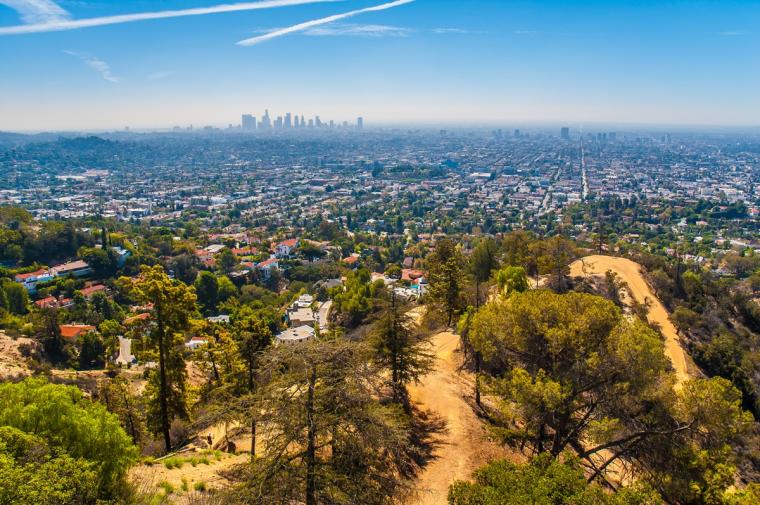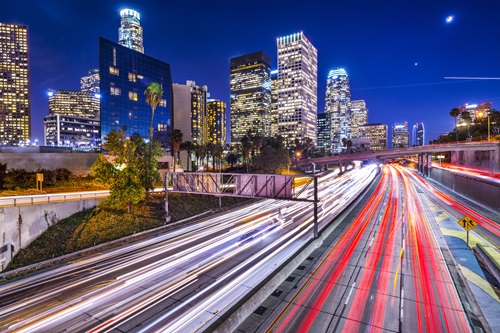
Now that the 2024 Summer Olympics and Paralympics are in the history books, it’s time to begin looking ahead to the 2028 Games in Los Angeles. Early reports, not surprisingly, have focused on organizers’ efforts to make them the greenest Olympics ever by going “car-free.”
In a city with all-day rush hours and connected to Interstate 5, one of the most-traveled north-south routes along the Pacific Coast? Yes, that’s the plan.
“We’re already working to create jobs by expanding our public transportation system in order for us to have a no-car Games,” Los Angeles Mayor Karen Bass said at a press conference in Paris shortly before the French handoff to the Americans. “And that’s a feat for Los Angeles, as we’ve always been in love with our cars. We’re working to ensure that we can build a greener Los Angeles.”
According to The New York Times, “Los Angeles must complete much-needed upgrades to the region’s transit system to handle an influx of athletes and visitors without bringing car traffic to a standstill. That includes extending rail lines, adding a legion of buses and clearing countless traffic lanes to allow hundreds of thousands of people to navigate a metropolis that sprawls across 4,000 square miles.”
TheConversation.com spells out the challenge in greater detail:
 Los Angeles is slowly rebuilding a more robust public transportation system. In addition to buses, it now has four light-rail lines — the new name for electric streetcars — and two subways. Many follow the same routes that electric trolleys once traveled. Rebuilding this network is costing the public billions, since the old system was completely dismantled.
Los Angeles is slowly rebuilding a more robust public transportation system. In addition to buses, it now has four light-rail lines — the new name for electric streetcars — and two subways. Many follow the same routes that electric trolleys once traveled. Rebuilding this network is costing the public billions, since the old system was completely dismantled.
Three key improvements are planned for the Olympics. First, LA’s airport terminals will be connected to the rail system. Second, the Los Angeles organizing committee is planning heavily on using buses to move people. It will do this by reassigning some lanes away from cars and making them available for 3,000 more buses, which will be borrowed from other locales.
Finally, there are plans to permanently increase bicycle lanes around the city. However, one major initiative, a bike path along the Los Angeles River, is still under an environmental review that may not be completed by 2028.
The 2028 Olympics represent a “catalytic moment” in the city’s attempt to reduce its dependence on cars, Laura Raymond, director of ACT-LA (which advocates for housing and transit improvements), told the Los Angeles Times.
“We need to make sure [the Olympics] is benefitting Los Angeles and not the other way around,” she said.
Being car-free means that spectators also will be unable to drive to any venues, forcing them to use public transit, ride a bike, get dropped off or simply walk.
“The unique thing about Olympic Games is that for 17 days, you can fix a lot of problems when you can set the rules for traffic, for fans, for commerce than you do on a normal day in Los Angeles,” Casey Wasserman, chair of LA2028, told ABC7.com. “The starting point is we take most fans who go to games in cars and put them in buses. We put all the athletes in buses, all the officials and the press in buses. In 1984, people don’t remember that [then Los Angeles Mayor] Tom Bradley had no truck deliveries except between midnight and 5 a.m. Now imagine the city of L.A. with no trucks.”
Some Los Angeles leaders have pivoted to using the term “transit-first” over “car-free.” As noted by Alissa Walker, editor of Torched, a newsletter dedicated to covering the city’s efforts hosting the 2028 Olympics (tagline: “So LA doesn’t get burned”), “the ‘car-free’ language was always more practical than aspirational — it was intended to manage expectations for attendees that there’s no parking available to them at venues, due to security perimeters. But I’d argue that describing LA’s Olympics as ‘car-free’ is both audacious and necessary. Each time it’s said out loud forces LA’s leaders to grapple with how they might, finally, address the urgent work of actually prioritizing the movement of people over vehicles. And there’s so much work to do.”
For what it’s worth, organizers of the Paris Games worked hard this year to make the Olympics environmentally friendly, with recycling and emissions-reduction efforts — although plans to eliminate air-conditioning in the Athletes’ Village backfired.

